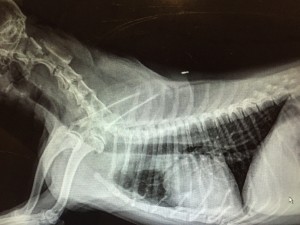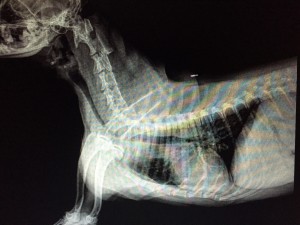WHAT?
Air travels from the back of the mouth to the chest via a windpipe called the trachea. The trachea normally has a rigid circular form (imagine a garden hose.) It is made of C-shaped cartilages that are stacked on top of each other. The ends of the C-shaped rings are connected by a thin membrane. In some dogs, the tracheal cartilages lose their rigidity and the membrane stretches and droops ...and the airway becomes obstructed!
WHO?
Tracheal collapse primarily occurs in small-breed dogs, such as miniature poodles, Yorkshire terriers, Maltese, Pomeranians and Chihuahuas. Bulldogs and other brachycephalic dogs (those with flat faces) are also predisposed to tracheal problems. Some dogs can start showing signs of tracheal collapse at a relatively young age, but it is usually a disease of older dogs.
WHY?
The cause is not well understood, but some have proposed genetic factors, nutritional influences, neurologic problems and degeneration of the tracheal cartilages as possible conditions that predispose dogs to tracheal collapse.
SIGNS?
Abnormal respiratory noises, difficulty breathing, blue gums and tongue from lack of oxygen, exercise intolerance and fainting may occur. A sudden onset, intermittent “goose-honking” cough (see video) is also a common sign.
TESTING?
X-rays are the easiest way of detecting tracheal collapse. On an x-ray, air or gas is black and a normal tracheal stripe is black and uniform in thickness throughout its entire length until it branches at the level of the heart. Of all dogs who have tracheal collapse only about 60% show flattened tracheal stripes on x-rays. Many times the collapse is dynamic and is not always obvious on an x-ray.

Can you tell the difference between the trachea in these 2 x-rays? The black tracheal stripe on the bottom is tapered and thinner, while the black tracheal stripe on the top keeps its normal thickness throughout the length of the trachea.
Fluoroscopy (a form of imaging that is like real-time x-rays) shows the movement of the trachea through the entire respiratory cycle and can detect some cases of tracheal collapse that are missed on plain x-rays. While x-rays are readily available at any general practice, fluoroscopy must be performed at a speciality hospital.
The definitive way to diagnose tracheal collapse is with a special scoping procedure. Fiberoptic viewing scopes are passed into the trachea to demonstrate the degree and exact location of the collapse. Scoping also allows collection of samples for bacterial culture - secondary infections can be a common concurrent problem. There are some inherent risks with this procedure and it is not usually performed in patients with suspected tracheal collapse.
TREATMENT?
Medical therapy can help dogs with mild tracheal collapse. It often includes cough suppressants, drugs to open the respiratory passages and antibiotics for secondary infections. Anti-inflammatory tablets or inhalers may be used on a short-term basis to reduce inflammation of the lining of the trachea. Some dogs benefit from tranquilizers during periods of excitement or anxiety. Avoiding warm environmental temperatures and stressful situations help many of these patients. Weight loss is especially important in obese patients with tracheal collapse.
Prosthetic stents that help the trachea maintain a round, rigid form have been tried. But because of the inherent risks and potential complications of stenting, surgery is reserved for those dogs with severe collapse and little or no response to medical therapy or for those who no longer respond to medications. This type of surgery is usually performed at a speciality hospital by an experienced surgeon.
PROGNOSIS?
Since tracheal collapse is a progressive disease, benefits initially achieved with medical therapy can lessen over time. However in many cases, medical therapy can provide relief, often for the life of the patient, improving the pet’s overall quality of life.
Learn more about how you can lessen the effects of tracheal collapse in your pet. Schedule an appointment with DTLAvets today!
